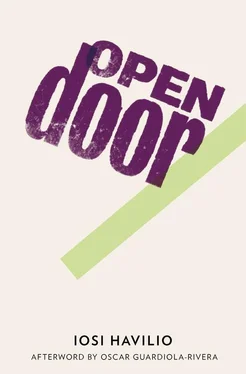Argentinian critic Alberto Manguel has argued that the third revolution in Hispanic literature hasn’t happened yet. He says that after Cervantes’ Don Quixote and Borges’ Ficciones , nothing revolutionary has come out of literature written in Spanish. And according to Manguel, the third revolution will not happen until writers face up to Borges’ challenge.
What challenge? Borges contended you couldn’t approach truth, ultimate meaning or ideal beauty directly because doing so, and being able to experience such things as the face of God, the meaning of the universe, or truth, would turn out to be a nightmare. The experience would be blinding and destructive. This is what happens, for instance, in David Lynch’s films: whenever his protagonist encounters in reality what she has been dreaming of or fantasising about, the result is catastrophic. What you should do is approach meaning indirectly, moving around it in circles while embracing the multi-layered surface of the real. Fiction, which structures reality, is like a candle moving about in a tomb: ultimately contingent and yet necessary. That is, if one is to keep one’s sanity amid impending darkness.
It is best to proceed by revealing one layer of appearance after another in the same way one peels an onion, but without expecting to get at the hard kernel. Warning: onions do not have hard kernels.
For example, with fantasy horror fiction, Borges counselled against describing or naming the monster. Instead, describe the environment, the alien architecture that would fit the creature, or relate to it only by considering its effects on everything else. Those who go straight for the revelation in such stories end up crazy. This is why Borges thought H. P. Lovecraft’s tales were brilliant but ultimately flawed: Lovecraft could not resist the urge to name his monsters.
In contrast, Iosi Havilio proceeds as Borges recommended: he describes effects rather than their causes and works through narrative rather than by naming. In fact, Havilio has gone further than Borges thought possible. In Open Door, Havilio suggests there may not be a single, comprehensible cause at all. Even if named it remains hidden, like God in the many Borgesian stories inspired by Jewish mysticism or by Kafka.
There may be an exception to this rule: on the back cover of the Spanish edition, Havilio names his monster: ‘ capitalismo + sálvese quien pueda ’ (‘capitalism + every man for himself’). Yet his revelation upholds the rule rather than undermining it. This is not the Tetragrammaton; it isn’t the revelatory name of God. Naming the creature here does not make it visible. As Havilio suggests, today’s monsters are quite unlike the iconic monsters of Borges’ time — the Hitlers, Pinochets and Videlas. Our gods and monsters, our tyrants and profiteers, are faceless.
If this is the case, if Havilio has dared to name his monster without spoiling his story, then he has not only stood up to Borges’ challenge. He has won. He’s not the only one, but Iosi Havilio stands out among a generation of Latin American writers who represent something new in literature. The third revolution in Hispanic literature has arrived.
Great literature, which like Open Door often develops a story of death foretold, does not seek to pacify its audience by producing catharsis after a moment of transgressive sex or violence. Rather, it aims at harnessing such violence, turning it into desire for change and then forming this desire into new law. As we all know, the law, as it is now and has been in the past, is somebody else’s desire — the desire of the powerful and the wealthy. Great literature defines itself against such desire. Put bluntly, great literature is revolutionary.
There is a lot of sex and violence in Open Door , but it is never gratuitous. The narrative opens with a ritual sacrifice of the kind that can only take place between lovers. When the protagonist arrives for the first time at Open Door and meets Jaime, we are told his role is that of the substitute: On the way to the stable, Jaime tells me that the horse is called Jaime, like him . One replaces the other. Likewise Jaime, the empty vessel, will replace a lost lover. A few paragraphs earlier, our protagonist met a girl staring at her from the window of a run-down village store. She is also a substitute. Like the characters, all moments — present, past, future — are identical and exchangeable. There’s no true novelty, only the repetition of the same. Something, somebody, has made time and people equivalent and interchangeable.
Sacrifice is a game of substitutions. In ancient times, this was the principle of magic. If you knew somebody’s name, you could control, seduce, even kill that person. That sacrificial game hovers over every erotic encounter in the novel. Are these passionate encounters or are the lovers mindlessly exchanging one another? Havilio’s descriptions of love-making are masterful precisely because they never let us decide. Is love possible in the era of capitalismo + sálvese quien pueda ?
Nothing here is quite what it seems. The snow melts and the ice cracks beneath your feet. There is a story within the story: that of Open Door, the psychiatric hospital that gives its name to both town and novel.
Our protagonist discovers an account of Open Door among the books in Jaime’s house. She’s no Borges, but soon enough she is on her way to the library. The librarian confirms that it is a rare find and begins translating it. Jaime denies the book is his. There seems to be a tantalising secret hidden in its pages.
What if all the incidents I’ve touched on are merely the fantasies of a patient interned in Open Door? After all, this is Argentina, where psychoanalysis is king and a session with one’s analyst is as common as a session with one’s beauty therapist in Brazil or Colombia. The aim is not too dissimilar: plastic surgery for the soul. The librarian’s translation reveals the pioneering therapeutic technique that gave Open Door its name and prestige. What if we’re all mad, oblivious to the fact that the whole world of capitalism + every man for himself is one big Open Door? Isn’t capitalism, in fact, a kind of plastic surgery for the soul?
Re-read this book, because nothing in this novel is quite what it seems. Not because there is some ultimate kernel of meaning waiting behind the lines of the last chapter, but because there are only appearances. The story remains in the surface, like smooth snow to the skier, who glides expertly over it oblivious to the fact he is heading towards a precipice. You have in your hands a masterpiece.
Oscar Guardiola-Rivera
London, June 2011
Dear readers,
With the right book we can all travel far. And yet British publishing is, with illustrious exceptions, often unwilling to risk telling these other stories.
Subscriptions from readers make our books possible. They also help us approach booksellers, because we can demonstrate that our books already have readers and fans. And they give us the security to publish in line with our values, which are collaborative, imaginative and ‘shamelessly literary’ (Stuart Evers, Guardian ).
All subscribers to our upcoming titles
are thanked by name in the books
receive a numbered, first edition copy of each book (limited to 300 copies for our 2011 titles)
are warmly invited to contribute to our plans and choice of future books
Subscriptions are:
£20 — 2 books (two books per year)
£35 — 4 books (four books per year)
To find out more about subscribing, and rates for outside Europe, please visit: http://www.andotherstories.org/subscribe/
Читать дальше












